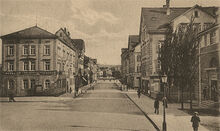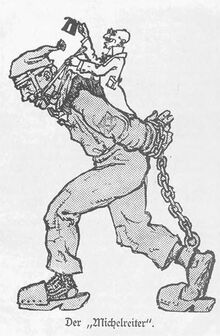Corner of Karlstraße and Uhlandstraße: Anti-Semitism before 1933
Station im Stadtrundgang: History Path to National Socialism
Until the post-war years, Gasthof Ochsen ("Ox Inn") could be found at the location of what is today the Zinser clothing store. During the Weimar Republic, this popular meeting place served as the backdrop for anti-Semitic riots. After Germany's defeat in World War I and the democratic revolution of 1918-19, anti-Semitism continually spread throughout Tübingen.
In January 1923, fraternity students beat up Jewish wood salesman Ludwig Marx in front of Gasthof Ochsen. A few days later students threatened Carl Hugo Dahl, brother-in-law of Jewish publisher Albert Weil. These actions were expressions of the political climate in the university town of Tübingen: a majority of students and professors, parts of the middle class as well as a number of public officials were harboring nationalist, anti-democratic, and anti-Semitic sentiments.
Jewish scholars were almost completely kept out of the university. Prominent professors uttered anti-Jewish statements. Almost all student fraternities had introduced the "Arierparagraph"("Aryan clause"), thereby barring Jews from joining. In 1925, right-wing extremist students tried to violently prevent a talk by Jewish pacifist Emil Julius Gumbel. Pupils from the Uhland-Gymnasium (high school) insulted lawyers Simon and Heinz Hayum; they also threatened Jewish cantor Josef Wochenmark's sons. In 1928, the synagogue was, for the first time, damaged by thrown rocks.
Anti-Semitic political parties and organizations as well as the social milieu of the university were forerunners of National Socialism in Tübingen
Image 1
Gasthof Ochsen ("Ox Inn"), on the left, around 1900. After attending a nationalist rally in January 1923, fraternity students attacked Jewish wood salesmen Lothar and Ludwig Marx here; Ludwig Marx was physically abused. The ringleaders were sentenced to only lenient penalties by the Tübingen Amtsgericht (district court) and the university's Disziplinarausschuss (disciplinary committee). Photo: City Archives Tübingen
Image 2
This popular anti-Semitic postcard featuring the Michelreiter motive (Michel is an allegory of Germany, Reiter means horseman) was sent from Tübingen to Munich in 1919. The German-völkisch Schutz- und Trutzbund (Protection and Defense League), the Alldeutscher Verband (Pan-German League), the German-nationalist Bürgerpartei (Citizen's Party), the Hochschulring Deutscher Art (German University Ring), and National Socialists agitated against Jews and the “Jews' Republic“ of Weimar. Image: Geschichtswerkstatt Tübingen e.V.



